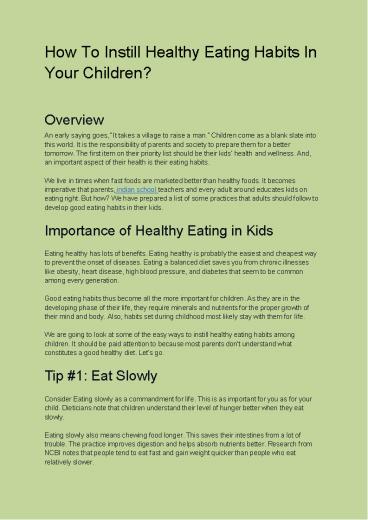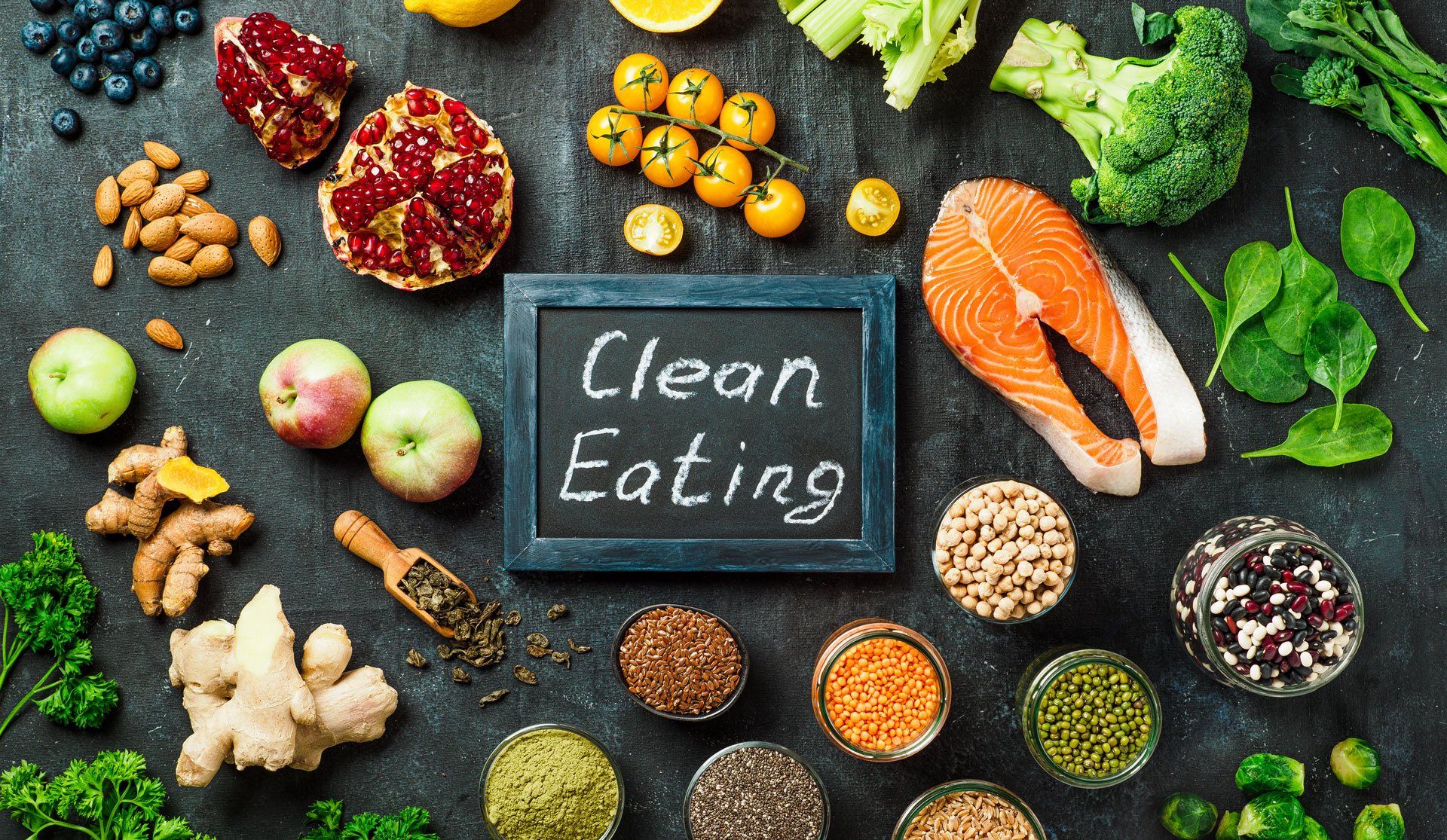
It is possible to eat healthy while on a tight budget, but it requires planning. While you might not be able afford the most expensive meals, you can still get a well-balanced meal at an affordable price. You just need to adapt your shopping habits and lifestyle to eat healthier while on a budget. Here are some tips to plan your meals. 1. Choose whole, unprocessed food over processed or packaged foods. These foods are often cheaper.
Always make a list when shopping for food. Do not be tempted by any of the tempting deals in the supermarket. These deals will make you spend more. It will reduce the cost per portion if you buy food in bulk. Don't forget to add lemon juice to your water if money is tight. These are just a few ideas to help you eat healthy on a budget. Be sure to always read labels and follow them.

Make sure you check the nutrition content of the food that you are buying. A cup of oatmeal has 104 calories, and 10g fat. It is better to buy family-sized meat than value-packed, as this can have high sodium and cholesterol. You can eat lean ground beef or turkey if you cannot eat processed foods. Low-fat options such as peanut butter are best. You can reduce your overall cost by choosing foods that are low in sodium and high in fiber.
Before you shop for food, make sure to create a shopping checklist. Avoid getting tempted by the tempting bargains at the supermarket. It's important not to get distracted by the seemingly good deals. They are intended to reduce shopping mistakes. You'll have a lower chance of spending too much on unnecessary items if you plan ahead. Just remember to read the food labels! Soon you'll be able to determine which foods are affordable!
Avoid processed foods. These are often high-priced and offer little nutritional value. Make sure you have enough staples to last you a long time, and they're not too costly. By buying bulk, you can save money on every serving if these staples are used frequently. Aside from being healthy, these foods are also inexpensive. You should be careful about falling for any tempting offers. They're not worth it! These are just a handful of ideas that will help you on a tight budget diet.

It is possible to read labels and verify the nutritional information in order to save money on food. Learn to read food labels to determine their cost. Also, you can check the expiry date of the packaging. It is crucial to adhere to your budget. A budget diet allows you to enjoy a variety of foods and to eat healthily while on a tight budget. Once you've read the food labels, you'll be able to plan your meals effectively.
FAQ
How Metabolic Health is Key to Aging Well
People are living longer lives today than at any point in history. They are also becoming more sick as a result. Our current medical science approach is not working, even though we've made many advances.
It is time to change the way we view health and aging. Healthy aging is possible only if we look at our metabolic health, not just weight loss, but also overall well-being.
To live a full and active life, your metabolism should be healthy all your life.
The good news is that there are many ways to improve your metabolic health. You can improve your metabolic health by incorporating these 7 foods in to your diet.
-
Resveratrol has been proven to increase cellular longevity. They also contain antioxidants and vitamins C & E.
-
Pinto beans and lentils are great sources of fiber and plant-based proteins. These nutrients help to keep blood sugar levels constant so they don't spike and crash.
-
Broccoli has sulforaphane. It has been proven to protect cells from DNA damage. It may even slow down cancer growth.
-
Chia Seeds are high-in omega-3 fatty acids, fiber, and other nutrients. They are also rich in antioxidants, protein, and fiber. All of these nutrients are good for heart health, brain function, gut health, and overall health.
-
Green tea contains catechins, which are polyphenols. Green tea catechins have been shown to reduce bone fractures, heart disease, cognitive decline, diabetes risk, and other health issues.
-
Salmonis packed with vitamin D, low in saturatedfat and one of best sources of lean meat.
-
Walnuts contain omega-3s and antioxidants like alpha lipoic acid (ALA). ALA boosts energy production and reduces inflammation.
Is it true that overeating protein causes kidney stones?
Protein helps maintain healthy bone and tissue. Over-consuming protein can result in calcium being excreted through the kidneys. This can cause kidney stones.
It is important that you note that not all people develop kidney stones when they consume more than 2 grams of protein per kg (2.2 pounds). You don't have to eat a lot of protein to get kidney stones.
You can prevent kidney stones by watching your sodium consumption. Sodium is important for maintaining the body's water balance. Too much sodium results in a higher risk of developing kidney stones.
If you have kidney stone, you might also consider reducing your protein intake. The majority of adults need protein for half their daily caloric needs. A reduction in protein intake will likely result in weight loss.
If you do decide to eat more protein, don't go overboard. Limit your intake to 20% of your total daily protein intake.
What is the best workout order?
It depends on what you are looking for. First, lift heavy weights if you are looking to increase muscle mass. Next, move on to cardio. For those who want to lose weight or exercise, you can switch from cardio to strength-training.
Start with cardio if you only want to lose fat. You can then add strength training.
Cardio is the best way to build muscle mass.
Also, eat before you workout. This will give your muscles more fuel, so they work harder. You will feel happier during your workout.
What are the best foods to avoid when trying weight loss?
Avoid foods that contain trans fats. Trans fats can increase LDL (the negative) cholesterol levels and decrease HDL (the positive) cholesterol.
Trans fats are found in deep-fried foods, fast food, packaged baked goods, snack cakes, and other processed foods.
These unhealthy fats cause inflammation which leads to heart disease, diabetes, and other health problems.
Avoid eating foods that contain artificial sweeteners. Artificial sweeteners can increase your risk of developing cancer.
These chemicals can be found in soft drinks, chewing gum, and candy bars. They appear in many other foods, including meat, poultry, fish, and eggs.
Artificial sweeteners include saccharin and sorbitol.
The American Heart Association suggests that you avoid these chemicals as they can cause DNA damage in your cells.
Egg is good for men?
The egg is rich in all nutrients needed by the human body. It is also good for maintaining strong bones, healthy heart and lungs, as well as stable blood pressure.
Eggs are a great source of protein, vitamins A and B12, D. E. K, calcium, magnesium, selenium and riboflavin.
The egg yolk has high cholesterol. The egg yolk does not contain saturated oil. Eggs have less saturated oil than many other foods.
They are also low-calorie and high in sodium. You can make them in any way you like. They can be cooked in a variety of ways: poach, saute, bake, hard-boil or fry.
They are delicious and very easy to prepare.
You should eat at least two whole eggs per day. You don't have to eat eggs.
Our bodies need eggs to provide the essential nutrients they require. Consider adding eggs to your daily meal plan today.
Statistics
- By John Thompson Take a whopping 38% off a set of PowerBlock Pros. (menshealth.com)
- Are You One of the 20% of Guys (mh.co.za)
- The PRS enabled risk stratification for overall prostate cancer and lethal disease with a four-fold difference between men in the highest and lowest quartiles (HR, 4.32; 95% confidence interval [CI], 3.16-5.89). (pubmed.ncbi.nlm.nih.gov)
- According to the American Academy of Dermatology (AAD), men over 50 are at a heightened risk of developing it. (healthline.com)
- According to the American Heart Association, blood pressure should be checked at least once every two years, beginning at age 20. (my.clevelandclinic.org)
External Links
How To
What nutrients does a man require daily?
Daily nutrition is essential for men's healthy growth. Your body needs vitamins, minerals and nutrients as well as carbohydrates, proteins, fats, carbohydrate, fiber, and other essential components.
The male body also requires specific nutrients at different times throughout the day. You can see that your body uses energy to make hormones. When you wake up, your body uses protein to repair damaged tissue and build muscles.
Your body burns fat at night and stores it as energy as glycogen. Your body has less energy but still requires enough nutrients during this time. You may have an occasional snack during the evening hours if you feel hungry.
For your body to function properly, it needs adequate amounts of protein and carbs. After a hard workout, muscle soreness may occur.
To prevent this, you must consume carbs and protein within 2 hours of training. To provide energy, your body will begin to break down stored glycogen.
Additionally, it is important to eat protein right away after your workouts are over. This prevents muscle tissue from being broken down while you are sleeping.
Your body makes lactic acid when you are doing intense physical activities. It is a form of lactic acid that builds up in the bloodstream. This causes fatigue. Eat foods high in carbohydrate, such as fruits, vegetables, to avoid this.
Carbohydrates can give your body the energy it requires to recover from intense exercise.
A healthy diet should include lean meats such as fish, eggs and milk, cheese, yogurts, beans, seeds, nuts, and beans.
All of these foods contain high-quality protein. Protein helps to repair and grow muscles. Protein is also necessary for the production of sex hormones such as testosterone.
A healthy skin, nails and joints requires sufficient dietary fats. Healthy men need between 20% - 35% of the total caloric intake to be fat.
Fat can help keep your heart healthy and protect you from cancer. It is essential for proper brain function.
Vegetable oils such as sunflower oil and soybean oil can provide most of your fat needs.
These oils are high-in monounsaturated, unsaturated fatty acid (MUFAs). MUFAs lower cholesterol and decrease inflammation. They protect your cells from damage by free radicals.
Saturated fats are found in animal products including meat, dairy products, butter and other dairy products. SFAs are known to raise LDL ("bad") cholesterol and raise triglycerides. They are also good for weight loss and belly fat.
Plant-based oils such as vegetable oil, nuts, seeds, or grains are rich in polyunsaturated fats (PUFAs). PUFAs reduce inflammation and improve cardiovascular function. They also reduce blood sugar, cholesterol, and other inflammatory factors.
Erectile dysfunction is common in men with low HDL ("good") cholesterol. The consumption of saturated fats raises bad cholesterol which in turn lowers good cholesterol.
Men who eat lots of red meat or pork can develop prostate problems. This is because these foods contain high amounts of nitrates. When cooked at high temperatures, nitrates can be converted to nitrosamines. These compounds can cause cancer.
Nitrites and other harmful chemicals are common in processed meats. These chemicals should be avoided.
According to the American Heart Association, you should limit your consumption of red meat to no more that 2 meals per week. Choose poultry, fish and legumes instead.